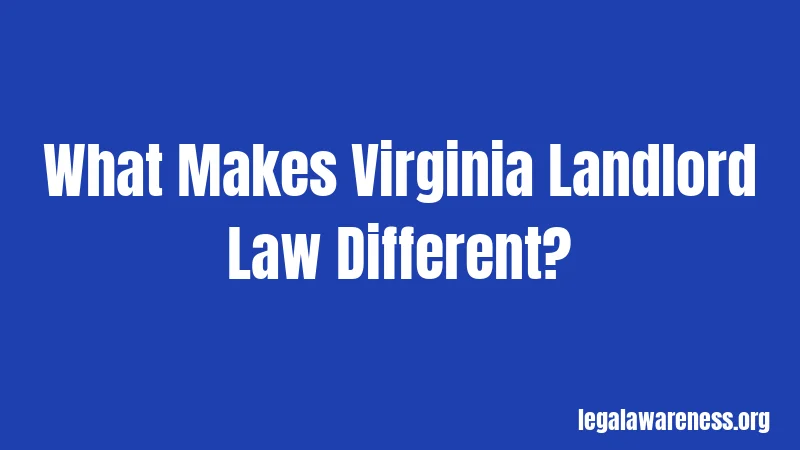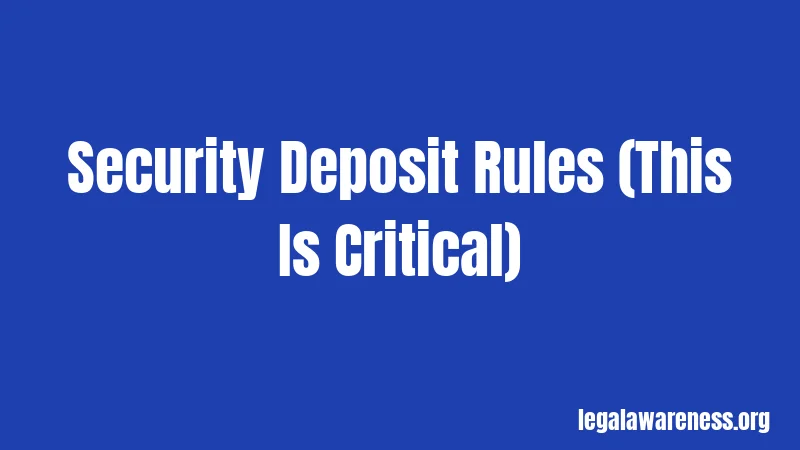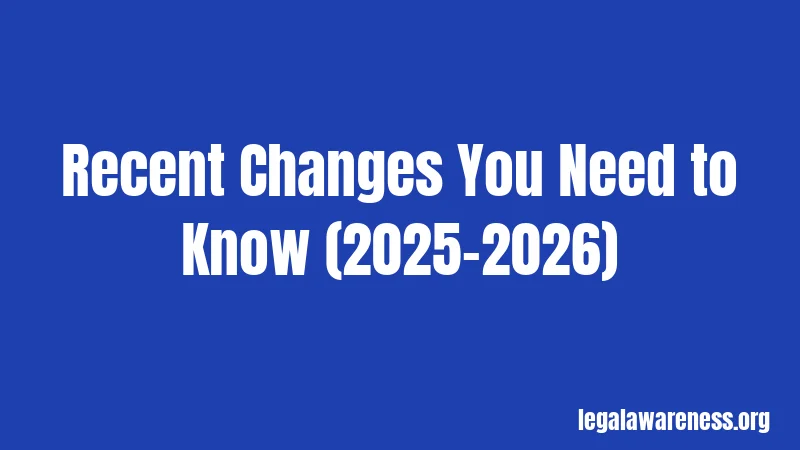Virginia Landlord Laws in 2026: What’s Changing This Year
Most landlords think they know the rules. Then Virginia’s latest laws hit them with surprises. If you’re renting out property in Virginia, you need to understand what changed in 2025 and what’s happening now in 2026. The rules are stricter than they used to be, and mistakes are expensive.
This guide breaks down exactly what Virginia landlords need to follow. We’re talking rent collection, security deposits, tenant rights, and what happens when things go wrong. By the end, you’ll know the basics and avoid costly mistakes.
What Makes Virginia Landlord Law Different?

Virginia has pretty landlord-friendly laws overall. There’s no rent control, which means you can set prices however you want. But—and this is important—the rules around deposits, fees, and tenant communication got a lot stricter recently.
Think of it like this: You have freedom in setting prices. But once you collect money, the state watches every move. Basically, handle the money wrong and you’re in trouble.
Basic Landlord Requirements in Virginia
The Lease Must Be in Writing
Here’s something many people miss. If your tenant is staying longer than 12 months, the lease absolutely must be written. Honestly, it should always be written even for shorter periods. A verbal lease? That’s basically asking for legal trouble.
Your written lease needs to include some specific information. You must list your name and the property address clearly. You also need to disclose all fees upfront on the first page. This changed in 2025, and landlords who don’t follow this rule can face problems.
Not sure what needs to be on that first page? Virginia law now requires an itemized list of every single charge you’re allowed to collect. This is preceded by a specific statement about no additional charges unless listed. Basically, transparency is non-negotiable now.
Providing the Statement of Tenant Rights
Every tenant gets a document called the Statement of Tenant Rights and Responsibilities. You must provide this before they sign anything. Both you and the tenant sign a form acknowledging they received it. Starting in 2025, these documents come in multiple languages including Spanish, Arabic, Chinese, Korean, and Tagalog.
Think of this as your legal protection. When a tenant signs off on this, they can’t later claim they didn’t know their responsibilities. Get these documents from the Virginia Department of Housing and Community Development website. They’re free.
Security Deposit Rules (This Is Critical)

Okay, this part is important. Virginia security deposit laws are strict—really strict. Getting this wrong costs landlords thousands of dollars. I’m talking double the deposit amount plus attorney fees.
How Much Can You Charge?
The maximum security deposit is two months’ rent. That’s it. If monthly rent is $1,500, you charge $3,000 maximum. No exceptions. This applies to all residential rentals with no variations based on property size or tenant type.
Can’t charge more? Wondering if you can add extra “damage deposits” or “pet deposits”? If they’re truly separate, some landlords try this. But honestly, it’s risky. The cleaner approach is building everything into one deposit up to the two-month limit.
The 45-Day Deadline (Don’t Miss This)
This deadline is absolutely critical. After a tenant moves out and returns the keys, you have exactly 45 days to return their deposit or provide a written itemized statement explaining deductions.
Miss this deadline by one day? You could lose the right to make ANY deductions. Worse, the tenant can sue for double the deposit amount. I watched a landlord lose $1,400 of legitimate deductions because they sent the statement on day 47. They ended up paying the tenant $2,800.
Here’s what that means: Set calendar reminders. Mark your calendar now. This isn’t something you handle “whenever.” It’s a court-enforced deadline.
What Can You Actually Deduct?
You can only deduct for specific things. These include unpaid rent, late fees (if they’re in the lease), unpaid utilities the tenant was responsible for, and damage beyond normal wear and tear.
What you CAN’T deduct? Normal use damage. Small nail holes from hanging pictures? That’s normal. Scuffed walls from moving furniture? Normal. Worn carpet from everyday walking? Also normal. You need actual damage that goes beyond what expected use creates.
Damage must be documented with photos and repair estimates. If the tenant disputes your deductions later, you’ll need proof. Take pictures at move-out. Get written estimates for repairs. Keep receipts. This documentation protects you in court.
The Move-Out Inspection
Virginia law requires a move-out inspection. Here’s the process:
When the tenant gives notice they’re leaving, you must inform them in writing of their right to be present at the inspection. This notice goes out within five days of their move-out notice. The inspection itself happens within 72 hours of when they return the keys.
The inspection is optional for the tenant. But if they request it in writing, you must allow them to attend. This actually works in your favor because the tenant sees exactly what you’re documenting.
After the inspection, provide the tenant with a written statement listing any damages. This statement is separate from the final deposit return statement.
New Payment Rules for 2025
Wait, this part affects a lot of landlords. Virginia passed new laws about how you collect rent and what fees you can charge.
No Payment Processing Fees (Usually)
You can’t charge a tenant a fee for paying rent, unless you offer an alternative payment method that doesn’t include fees. Think about this carefully. If you charge a credit card processing fee, you must also accept checks or cash with no fee attached.
There’s one exception: Landlords with four or fewer rental units don’t have to accept credit cards at all. So if you’re a small operator with just a few properties, you can require checks or money orders only. Anything else requires offering a fee-free option.
When tenants pay with cash or money order, you must provide a written receipt if they ask for one.
What About Late Fees?
Late fees can’t exceed 10% of the monthly rent or 10% of the unpaid rent balance, whichever is smaller. Your lease must specify what the late fee is. No surprise fees allowed.
These rules sound simple but landlords mess them up constantly. Make sure your lease lists the exact fee. Then stick to what you listed.
Recent Changes You Need to Know (2025-2026)

Virginia passed some significant changes that took effect July 1, 2025. These aren’t optional—they’re the law now.
Lease Termination Requirements
Landlords must now provide written notice 60 days before the lease ends if you decide not to renew. This applies if you own more than four rental units. This doesn’t mean tenants can’t move out earlier. It means you have to give them 60-day notice that you’re not renewing.
The notice must appear on the first page in clearly readable type. Include the statewide legal aid phone number and website address.
There’s an exception for victims of domestic abuse, sexual violence, stalking, or trafficking. These tenants can terminate their lease with 28 days’ notice if they provide legal documentation (police report, protective order, etc.).
The Eviction Diversion Program
This is new. Virginia now has an eviction diversion program available statewide. Previously, only certain cities offered this. Now any local general district court can implement their own program to help tenants avoid eviction through structured repayment plans.
This means if a tenant misses rent, they might have an opportunity to work out a payment plan through the court instead of facing eviction. Understand that this exists in your local court system.
Federal Shutdown Protection
Here’s an interesting protection: If federal employees, contractors, or subcontractors can’t get paid because of a federal government shutdown, they can request a 60-day continuance in eviction cases for nonpayment. This applies if the shutdown lasts 14 days or longer.
You can’t evict a federal employee for nonpayment if they can prove their income stopped due to a shutdown. They get time to catch up.
Tenant Maintenance Responsibilities
Listen, this matters because it’s where disputes happen. Virginia law says you must keep the property in livable condition. The tenant must keep it clean and report problems.
Your Responsibility: Maintenance
You must make all repairs needed to keep the unit habitable. This includes the roof, foundation, plumbing, electrical systems, heat, and hot water. The tenant must give you written notice of problems and reasonable time to fix them (usually 14 days).
If you don’t make repairs, the tenant can actually repair it themselves and deduct the cost from rent. Or they can break the lease without penalty. This is serious. The law strongly protects tenants from living in uninhabitable conditions.
Their Responsibility: Keeping It Clean
Tenants must keep the property clean, use utilities reasonably, dispose of garbage properly, maintain plumbing fixtures, report pests immediately, and prevent mold growth. They can’t make alterations without written permission. They must respect neighbors and maintain reasonable quiet.
If tenants breach these responsibilities, that’s where your security deposit deductions come in. Document everything carefully.
Fair Housing Protections in Virginia
Virginia landlord laws include strong fair housing protections. You can’t discriminate based on race, color, religion, national origin, gender, disability, familial status, elderliness (anyone 55+), or sexual orientation.
Here’s one that’s often missed: A landlord must consider a person’s status as a domestic abuse survivor when reviewing their credit score. A survivor can show this status with a court order, police report, or letter from a domestic violence program.
Also, you can’t use negative credit information that resulted from COVID-19 hardships against applicants.
Don’t discriminate in showing properties, either. Realtors, agents, and landlords must show all available properties based on financial ability only.
The penalties for fair housing violations are serious. The Virginia Fair Housing Office can investigate complaints. Violations can include fines, required training, and civil lawsuits from tenants.
What Happens With Eviction?
Okay, so the tenant won’t pay rent. Or they’re violating the lease badly. What’s the process?
You Can’t Just Remove Them
Never, ever try to remove a tenant yourself. That’s illegal. Even if they won’t leave, you must go through the court process. This means sending a written notice first, then filing an unlawful detainer lawsuit.
The court must give you an order of possession. Then the Sheriff enforces it. Only the Sheriff can physically remove someone. You can’t change locks, remove their belongings, or shut off utilities yourself.
Doing this illegally can result in the tenant suing YOU for damages. It’s not worth it.
The Notice Requirement
For nonpayment of rent, you must give written notice and allow 5 days to pay. For other violations, you give notice of the problem and reasonable time to fix it (usually 14-30 days depending on the violation).
If they don’t fix it, then you can file for eviction.
The Court Process
After you file, there’s a court hearing. The tenant gets five calendar days for an initial hearing. At this hearing, the judge might order the tenant to leave, require you to fix conditions, or resume essential services.
There might be a second hearing within 10 days. The whole process takes time. It’s not instant.
What Landlords Can’t Do
Virginia law prohibits certain lease clauses even if tenants agree to them:
You can’t require tenants to waive legal rights. You can’t charge non-refundable deposits or fees (all fees must be refundable). You can’t require tenants to pay for your attorney fees in a dispute unless the lease specifically allows it and it’s reasonable.
You can’t demand payment that’s “extra” beyond rent, fees listed on the lease, and deposits up to two months’ rent.
What You Need to Do Now
Sound overwhelming? Here’s your action list. Actually do these things:
Get the current Statement of Tenant Rights and Responsibilities document from Virginia’s Department of Housing and Community Development. Make sure your lease includes all required disclosures on the first page. Set up a system to track the 45-day deadline for deposit returns. Document everything in writing—emails, texts, notice dates, all of it.
Create templates for the required notices. Review your lease for any language that violates Virginia law. Train yourself or your property manager on fair housing rules. Consider using a property management company if this gets too complicated.
Most importantly, stay current on changes. Virginia’s laws keep evolving.
Frequently Asked Questions
Can I raise rent whenever I want? Yes, Virginia has no rent control. You can increase rent as much as you want. But you must follow lease terms about when increases take effect. If the lease says rent increases annually, follow that schedule. You can’t randomly change rent mid-lease.
How long do I need to keep deposit records? You must keep itemized deduction records for at least two years. Keep all receipts, repair estimates, and documentation of damages. Tenants have the right to inspect these records.
What if the tenant provides no forwarding address? If they don’t provide an address, you must make reasonable efforts to locate them. After one year from the end of the 45-day return period, you can transfer unclaimed deposits to the Virginia State Treasury. Then you’re off the hook legally.
Can I charge for “normal” cleaning when tenants move out? Not unless the lease specifically requires professional cleaning AND the unit is in really bad condition. Normal vacuuming and light cleaning are the tenant’s responsibility. But if they left it filthy, you might be able to charge. Get an estimate to document the cost.
What if a tenant breaks the lease early? That depends on the lease terms and the reason. If they break without cause, you can typically keep the security deposit and sue for remaining rent. But Virginia protects tenants from domestic abuse, trafficking, and sexual violence—they can break with proper notice and documentation.
Do I have to provide an attorney? No. You don’t have to pay for a tenant’s attorney. But if you violate laws and they sue, the court can order you to pay their reasonable attorney fees. That’s why following the rules matters.
Final Thoughts
Virginia landlord laws are changing and getting stricter on fee transparency and tenant protections. The good news? The rules are pretty clear once you understand them. The bad news? Mistakes are expensive.
Follow these main rules: Keep everything in writing. Meet every deadline. Document everything. Be fair in showing properties and evaluating tenants. Pay security deposits back on time with itemized statements. Offer at least one no-fee payment option.
Honestly, following these rules protects you more than they hurt you. When you operate fairly and professionally, disputes stay minimal. Tenants don’t sue. The court doesn’t fine you. It all works smoothly.
Stay informed, stay organized, and when in doubt, ask a lawyer. It’s worth the consultation fee to avoid the lawsuit fee.
References
- Virginia Department of Housing and Community Development – Landlord Tenant Resources
- Virginia Residential Landlord and Tenant Act Handbook
- Virginia Code § 55.1-1226 Security Deposits
- National Low Income Housing Coalition – Virginia Rental Fees Laws 2025
- Kramer Elias – Virginia Landlord-Tenant Law Updates 2025
